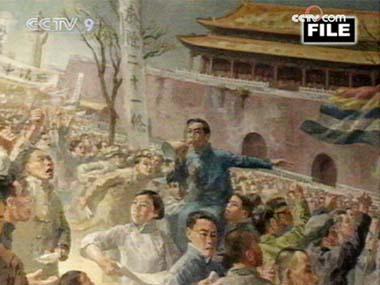Source: CCTV.com
05-05-2009 09:09
May 4th is Youth Day in China. It's a day of great significance in Chinese history, and was stipulated as Youth Day by the central government in 1949. May 4th is linked with an anti-imperialist and anti-feudal revolutionary movement back in 1919.
In January of 1919, the Paris Peace Conference was held with 27 countries in attendance. China sent a delegation to the conference, but its demands were paid no attention by the Western Allies, led by the United States, the United Kingdom and France.
 |
| It's a day of great significance in Chinese history, and was stipulated as Youth Day by the central government in 1949. |
Wang Suli, a research fellow from Chinese Communist Party History Studies said, "The Versailles Treaty of April 1919 gave German concessions in China's Shandong province to Japan. The Northern-Warlord-controlled government bowed to the Western Allies and was going to sign the treaty to cede the rights. The incident touched off the May 4th Movement."
On the afternoon of May 4th 1919, three thousand students from Peking University and 12 schools gathered at Tiananmen Square and held a demonstration. They voiced their anger at the Allies' betrayal of China and the government's inability to secure Chinese interests at the conference.
The students also insisted on the resignation of three Chinese officials involved in the proceedings. The angry crowd burned down the residence of Cao Rulin, one of the despised officials, and set off the May 4th Movement. Thirty two students were arrested on the first day, which further inflamed the protestors.
The next day, students in Beijing went on strike, followed by those in other parts of China. From early June, workers and businessmen in Shanghai also went on strike to support the students. The strike spread nationwide, with workers in over 100 cities taking part.
Prof. Yi Jiexiong from Marxist Department of Peking University said, "Pioneering intellectuals like Chen Duxiu and Li Dazhao directed and promoted the development of the movement, writing essays, and distributing brochures to students."
Under intense public pressure, the Northern-Warlord-controlled government released the arrested students and dismissed Cao Rulin, Zhang Zongxiang, and Lu Zongyu from their posts.
The Chinese representatives in Paris refused to sign the peace treaty, and the May 4th Movement won an initial victory.
The May 4th Movement promoted the spread of Marxism in China, and prepared the ideological foundation for the establishment of the Chinese Communist Party.
Click for more news in Culture Express>>
Editor:Zhao Yanchen
